Good morning!
Greetings in the name of the Father, the son, and the Holy Spirit.
“He is not here; He has risen! Remember how He told you while He was still with you in Galilee: ‘The Son of Man must be delivered over to the hands of sinners, be crucified and, on the third day, be raised again.” (Luke 24:6-7)
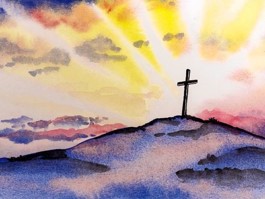
Saturday evening, when the Sabbath ended, Mary Magdalene, Mary the mother of James, and Salome went out and purchased burial spices so they could anoint Jesus’ body. Jesus was crucified on the prior day, Friday, and buried in a new tomb recently cut into the rock, which belonged to Joseph. Joseph was the person who requested Jesus’ body from Pontius Pilot, put Jesus’ body in the tomb, and rolled a big stone in front of the entrance to the tomb.
Less than a week ago, on the last Sunday, Jesus entered Jerusalem. He was on a donkey, and a large crowd gathered to see Jesus. They heard about and wanted to see Jesus, who comforted the poor in heart, healed the sick, and gave hope to the hopeless. At that time, they suffered under Roman occupation and always searched for one who liberated them. There were also religious leaders and teachers of the law, who supposedly helped and gave comfort and peace but did the opposite. Thus, they always yearned for the Messiah, who could liberate them from oppression and bondage.
Thus, they always hoped the Messiah would come and liberate them someday. Then, they would live in peace with the Messiah. There would be no more injustice, mistreatment, and oppression in the new kingdom of Messiah.
Because the people suffered, whenever they heard about Jesus, they hoped Jesus was the Messiah. Jesus taught the people as one who had authority and not as their teachers of the law. Jesus always brought Heavenly peace into their hearts. Thus, all came out to see Jesus, and they saw Jesus humbly riding on a donkey.
As Jesus entered Jerusalem, the very large crowd spread their cloaks on the road, while others cut branches from the trees and spread them on the road. The crowds that went ahead of Jesus and those that followed shouted,
“Hosanna to the Son of David!”
“Blessed is he who comes in the name of the Lord!”
“Hosanna in the highest heaven!” (Matthew 21:9b)

When Jesus entered Jerusalem, the whole city was stirred and asked, “Who is this?”
At that time, Jerusalem was fully filled with people visiting the Jerusalem temple during the Passover season. The very large crowd cheering Jesus was a nuisance, which was in the way of the orderly conduct of the Passover festival in the Temple.
But the crowds gathered around Jesus were truly excited. The crowds believed Jesus was the true Messiah and thought the Messiah finally entered Jerusalem to liberate them from the Romans and give them everlasting peace. Thus, the crowds almost shouted back, “This is Jesus, the prophet from Nazareth in Galilee.”
Jesus clearly knew what was going on in the hearts of the crowds around Him and most of the people in Jerusalem, especially the hearts of the religious leaders who thought that Jesus was a serious threat to them. The religious leaders saw Jesus raise Lazarus. And more and more people followed Jesus.
Jesus exposed religious leaders’ empty rituals without hearts to God and the neighbors, opposite to their teaching: love God and neighbors. They simply followed the elders’ tradition. They also taught people to keep the elders’ tradition. They treated the tradition of elders so sacred that nobody should contest them. In that way, they kept the elder’s transitions inherited for generations. In some sense, the religious leaders treated the elder’s tradition as more important to keep than God’s word, while Jesus taught God’s word and the true intention of God’s word.
One day Caiaphas, who was high priest at that time, said, “You don’t know what you’re talking about! You don’t realize that it’s better for you that one man should die for the people than for the whole nation to be destroyed.”
Caiaphas did not say this on his own; as high priest at that time, he was led to prophesy that Jesus would die for the entire nation. And not only for that nation, but to bring together and unite all the children of God scattered around the world.
So from that time on, the Jewish leaders began to plot Jesus’ death. As a result, Jesus stopped his public ministry among the people and left Jerusalem. He went to a place near the wilderness, to the village of Ephraim, and stayed there with his disciples. Then Jesus came to Jerusalem during the Passover celebration, and Jerusalem was completely filled with people from all parts of the nation.
On the other hand, Jesus was preparing for His destiny to fulfill the purpose of coming to the earth. However, the people gathered around Jesus had their own thoughts to fit their needs.
The following Monday, Jesus returned with his disciples to Jerusalem. When Jesus arrived at the Temple, he found the courts full of corrupt money changers. He began overturning their tables and clearing the Temple, saying,
“The Scriptures declare, ‘My Temple will be a house of prayer,’ but you have turned it into a den of thieves” (Luke 19:46).

Jesus saw the Temple filled with money changers who changed ordinary money to Temple money with which people could purchase sacrifices. By allowing such business, those who were in charge of Temple profited. The Passover festival was the biggest season for them. Jesus knew what was going on behind the scene and cleaned the Temple to restore its original purpose, where r the people came to meet and talk to God through prayers.
On the following day, Tuesday morning, Jesus and his disciples returned to Jerusalem. Back at the Temple, Jesus told the truth about religious leaders’ heartless service to God, which made them upset even more. However, rather than confessing their sin, they decided to surely kill Jesus.
After the discourse with the religious leaders, Jesus left the city and went with his disciples to the Mount of Olives, which sits due east of the Temple and overlooks Jerusalem. Jesus saw Jerusalem and deeply grieved over Jerusalem.
“O Jerusalem, Jerusalem, the city that kills the prophets and stones God’s messengers! How often I have wanted to gather your children together as a hen protects her chicks beneath her wings, but you wouldn’t let me. And now, look, your house is abandoned and desolate. For I tell you this, you will never see me again until you say, ‘Blessings on the one who comes in the name of the Lord!’” (Matthew 23:37-39)
Jerusalem lamented over Jerusalem. Jerusalem did not know what it was about to do. On that day, Judas Iscariot sold Jesus thirty pieces of silver. Thus, the religious leaders were fully ready to arrest and kill Jesus.
On Thursday, knowing all these, Jesus had a Passover meal with His disciples, including Judas Iscariot, who sold Jesus in one room. Jesus knew it was the last chance to share the Passover meal with His disciples. Jesus knew that the Father had given him authority over everything and that he had come from God and would return to God:
“I have been very eager to eat this Passover meal with you before my suffering begins. For I tell you now that I won’t eat this meal again until its meaning is fulfilled in the Kingdom of God.” (Luke 22:15-16)
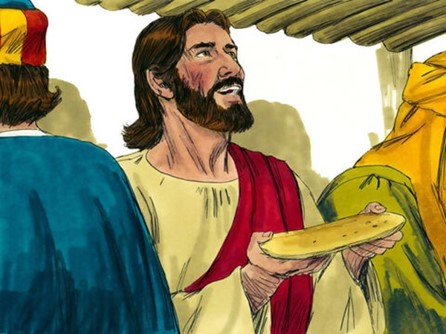
Soon Jesus got up from the table, took off His robe, wrapped a towel around His waist, 5and poured water into a basin. Then He washed the disciples’ feet, drying them with the towel He had around Him. Jesus showed how to serve each other. Washing feet was the job of slaves. Although Jesus was the true Master and King, He was humble to be a slave to wash His disciples’ feet.
Then Jesus talked about betrayal by one of His own disciples. All denied, including Judas Iscariot, who had already sold Jesus. But Jesus responded, “It is the one to whom I give the bread I dip in the bowl.” And when he had dipped it, he gave it to Judas, son of Simon Iscariot. Then Jesus told him, “Hurry and do what you’re going to do.” None of the others at the table knew what Jesus meant. Since Judas was their treasurer, some thought Jesus was telling him to go and pay for the food or to give some money to the poor. So Judas left at once, going out into the night.
Then Jesus explained His mission to be a sacrifice for the world’s sins. At that time, no disciples understood what Jesus really meant. Without knowing the details, Peter insisted on being with Jesus, although he would get killed. Jesus gently responded to Peter that Peter would deny Jesus three times.
That night Jesus took them to a place where Jesus usually prayed with the disciples, but that night no disciples prayed together with Jesus. They all slept, although Jesus woke them up three times. On the third time, Jesus woke them up again and took them to the place where the soldiers would come and arrest Jesus.
Then Judas Iscariot came and kissed Jesus as a sign to arrest Jesus because it was dark. The soldiers immediately arrested Jesus. Peter resisted Jesus’ arrest with his sword, but soon he fled like the other disciples. When the soldiers took Jesus, none of Jesus’ disciples was with Jesus.
On Friday, Jesus was falsely accused by the religious leaders and then sentenced to death on cross. The soldiers nailed Jesus on a cross, and Jesus suffered and bled to death. On the cross, Jesus said His love to the people. What was the first word of Jesus on the cross?
“Father, forgive them, for they don’t know what they are doing.” (Luke 23:34a)
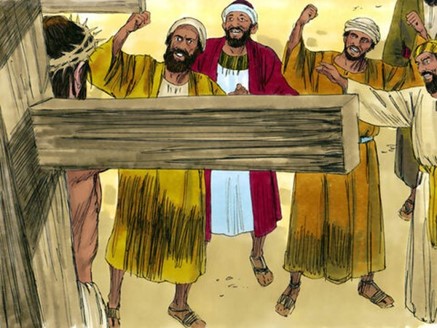
On the cross, Jesus forgave all, who falsely accused Him, unjustly sentenced Him to crucifixion, nailed Him on the cross, and mocked Him. Even so, the Jesus’s word was not heard by them. They should have confessed their sins. Instead, they yelled at Jesus. Some even tempted Jesus:
“Look at you now!” they yelled at Him. “You said you were going to destroy the Temple and rebuild it in three days. Well then, if you are the Son of God, save yourself and come down from the cross!” (Matthew 27:40)
Even so, Jesus patiently endured for us – to forgive all sins by being the one and only one perfect sacrifice once and for all. On the cross, Jesus had never stopped loving all those who were at the scene. Jesus truly demonstrated the true love that is infinitely patient and kind to all, including the people hurling insults and adding pain.
Love is patient and kind. Love is not jealous or boastful or proud or rude. It does not demand its own way. It is not irritable, and it keeps no record of being wronged. It does not rejoice about injustice but rejoices whenever the truth wins out. Love never gives up, never loses faith, is always hopeful, and endures through every circumstance. (1 Corinthians 13:4-7)
Jesus was in agony for six hours on the cross, and finally, He breathed His last breath, and said:
“It is finished.” (John 19:30 b)
Then Jesus bowed his head and gave up his spirit. It was the moment Jesus offered Himself as the perfect sacrifice for all our sins.
The religious leaders, who did not know the truth, declared victory. Jesus was dead. There would be no more threat from Jesus. They truly rejoiced over what they did unjustly and went home. It was Friday evening.
But it was not the end of the story.
Very early on Sunday morning, just at sunrise, the three women went to the tomb with what they had prepared on the previous evening – Saturday evening. On the way to Jesus’ tomb, they were asking each other, “Who will roll away the stone for us from the entrance to the tomb?”
Suddenly there was a great earthquake! For an angel of the Lord came down from heaven, rolled aside the stone, and sat on it. His face shone like lightning, and his clothing was as white as snow. The guards shook with fear when they saw him, and they fell into a dead faint.
Then the angel spoke to the women.
“Don’t be afraid!” he said. “I know you are looking for Jesus, who was crucified. He isn’t here! He is risen from the dead, just as he said would happen. Come, see where his body was lying. And now, go quickly and tell his disciples that he has risen from the dead, and he is going ahead of you to Galilee. You will see him there. Remember what I have told you.” (Matthew 28:5b-7)
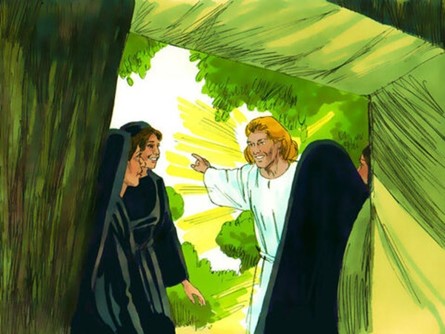
The women ran quickly from the tomb. They were very frightened but also filled with great joy, and they rushed to give the disciples the angel’s message.
We know the rest of the story. Jesus rose from the dead on the Sunday morning. And the story of Jesus’ resurrection quickly spread through Jesus’ disciples and followers. Even today, we spread the most blessed News, “Jesus has risen! He is risen indeed!”
Jesus fulfilled His mission with His love on the cross by dying for all on the cross. And then, on the third day, Jesus rose again by conquering death and became the first fruit for all who believed in Jesus. Although those who were against Jesus thought Jesus failed, Jesus had never failed, and His love did neither. On the Easter Sunday morning, Jesus won the victory in His love toward all. Thus, everyone who believes in the Risen Lord, Jesus, will never perish but have eternal life. Surely, His love on the cross toward us had never failed and will not fail forever. Hallelujah!
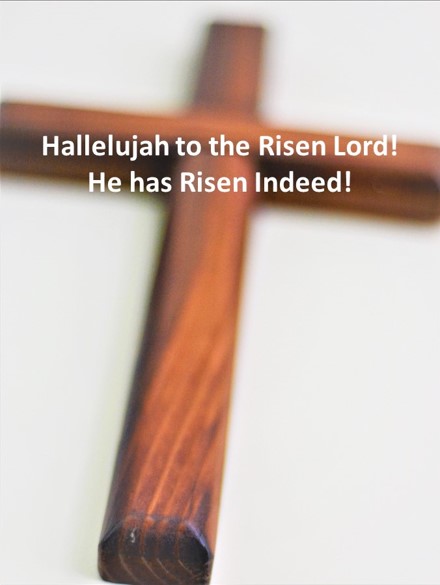
Love never fails. But where there are prophecies, they will cease; where there are tongues, they will be stilled; where there is knowledge, it will pass away. (1 Corinthians 13:8)
